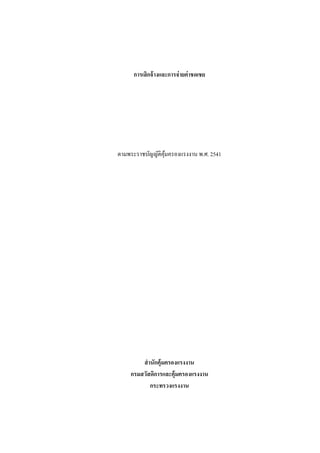
Termination of employment and severance pay
- 2. การเลิกจ้างและการจ่ายค่าชดเชย พระราชบัญญัติคุ้มครองแรงงาน พ.ศ. 2541 ได้กําหนดหน้าที่ของนายจ้างและสิทธิของลูกจ้างกรณีการเลิกจ้าง ทั้งนี้โดยอาศัยหลักการตามอนุสัญญาองค์การแรงงานระหว่างประเทศ ฉบับที่158 ที่กําหนดเรื่องการเลิกจ้าง คือ 1. ห้ามนายจ้างเลิกจ้างลูกจ้างโดยปราศจากเหตุผลอันสมควรที่เกี่ยวข้องกับความสามารถหรือพฤติกรรมของ ลูกจ้าง 2. ลูกจ้างจะต้องได้รับการแจ้งให้ทราบล่วงหน้าก่อนการเลิกจ้างหรือได้รับค่าชดเชยหรือการชดเชยแบบอื่นๆ เว้นแต่ลูกจ้างจะกระทําความผิดอย่างร้ายแรง 3. ในกรณีที่มีการเลิกจ้างอย่างไม่เป็นธรรม หากนายจ้างไม่สามารถรับลูกจ้างกลับเข้าทํางานได้ลูกจ้างต้องได้รับ เงินชดเชยอย่างเพียงพอ จากหลักการเรื่องการเลิกจ้างตามอนุสัญญา ILO ดังกล่าว พระราชบัญญัติคุ้มครองแรงงาน พ.ศ. 2541 ได้ กําหนดให้นายจ้างจ่ายค่าชดเชยให้แก่ลูกจ้างซึ่งเลิกจ้าง ทั้งนี้การเลิกจ้างได้แก่ การที่นายจ้างไม่ให้ลูกจ้างทํางานต่อไปและ ไม่จ่ายค่าจ้างให้ ไม่ว่าจะเป็นเพราะเหตุสิ้นสุดสัญญาจ้างหรือเหตุอื่นใด และการที่ลูกจ้างไม่ได้ทํางานและไม่ได้รับค่าจ้าง เพราะเหตุที่นายจ้างไม่สามารถดําเนินกิจการต่อไป โดยมีเจตนารมณ์ในการให้ความคุ้มครองลูกจ้างซึ่งต้องถูกเลิกจ้างให้ ได้รับค่าชดเชย ไม่ว่าจะเป็นกรณีนายจ้างเป็นฝ่ายให้ลูกจ้างออกจากงาน นายจ้างเลิกกิจการ หรือ ลูกจ้างต้องออกจากงาน เพราะสัญญาจ้างสิ้นสุดลง ยกเว้นกรณีดังต่อไปนี้ 1.ลูกจ้างลาออกจากงานโดยสมัครใจ 2.ลูกจ้างที่ทําสัญญากับนายจ้างโดยมีกําหนดระยะเวลาการจ้างไว้แน่นอน และนายจ้างเลิกจ้างตามกําหนด ระยะเวลานั้น สําหรับงานที่ต้องแล้วเสร็จภายใน 2 ปี โดยนายจ้างและลูกจ้างได้ทําสัญญาเป็นหนังสือไว้ตั้งแต่เมื่อเริ่มจ้าง และเป็นการจ้างงานใดงานหนึ่งที่ทําชั่วคราวในช่วงเวลาอันสั้นแล้วเสร็จสิ้นไป ซึ่งการว่าจ้างถือเอาความแล้วเสร็จของ งานเป็นสาระสําคัญในการกําหนดระยะเวลาการจ้าง ได้แก่งานดังต่อไปนี้ 2.1 งานในโครงการเฉพาะที่มิใช่งานปกติของธุรกิจหรือการค้าของนายจ้างซึ่งต้องมีระยะเวลาเริ่มต้นและ สิ้นสุดของงานที่แน่นอน เช่น งานค้นคว้าทดลอง หรืองานสํารวจวิจัยซึ่งอาจเป็นการทําลองผลิตสินค้าชนิดใหม่ก่อน นําเข้าสู่กระบวนการผลิตตามปกติของธุรกิจนายจ้าง หรือการสํารวจหาแหล่งขุดเจาะนํ้ามันในกิจการโรงกลั่นนํ้ามัน ซึ่ง งานเหล่านี้มิใช่งานที่ทําเป็นปกติธุระในกิจการของนายจ้างนั้น 2.2 งานอันมีลักษณะเป็นครั้งคราวที่มีกําหนดการสิ้นสุด หรือความสําเร็จของงาน เช่น จ้างลูกจ้างเป็นช่างไม้ ช่างปูน ช่างผูกเหล็กในงานรับเหมาก่อสร้างซึ่งงานจะเสร็จตามหน้างาน หรือนายจ้างประกอบกิจการผลิตสินค้าสําเร็จรูป ได้จ้างลูกจ้างมาต่อเติมอาคารหรือซ่อมกําแพงโรงงานจนแล้วเสร็จ 2.3 งานที่เป็นไปตามฤดูกาลและได้จ้างในช่วงเวลาของฤดูกาลนั้น เช่น จ้างลูกจ้างทํางานในการผลิตซึ่งอาศัย พืชผลตามฤดูกาล เช่นโรงงานนํ้าตาล โรงงานผลิตผลไม้กระป๋ อง
- 3. - 2 - ถ้าเป็นการจ้างงานที่มีกําหนดระยะเวลาแน่นอนในงานอื่นซึ่งมิใช่งาน 3 ประเภทนี้ ก็ไม่ใช่กรณียกเว้นเรื่อง ค่าชดเชย ลูกจ้างที่ถูกเลิกจ้างและไม่อยู่ในกรณียกเว้นข้างต้น รวมทั้งไม่อยู่ในกรณียกเว้นตามมาตรา 119 ด้วย จะมีสิทธิ ได้รับค่าชดเชยต่อเมื่อมีอายุงานตามเกณฑ์ที่กําหนดดังนี้ 1. ลูกจ้างที่มีอายุงานครบ 120 วัน แต่ไม่ครบ 1ปี จ่ายไม่น้อยกว่าค่าจ้าง 30 วัน 2. ลูกจ้างที่มีอายุงานครบ 1ปี แต่ไม่ครบ 3ปี จ่ายไม่น้อยกว่าค่าจ้าง 90 วัน 3. ลูกจ้างที่มีอายุงานครบ 3 ปีแต่ไม่ครบ 6ปี จ่ายไม่น้อยกว่าค่าจ้าง 180 วัน 4. ลูกจ้างที่มีอายุงานครบ 6 ปีแต่ไม่ครบ 10ปี จ่ายไม่น้อยกว่าค่าจ้าง 240 วัน 5. ลูกจ้างที่มีอายุงานครบ 10ปีขึ้นไป จ่ายไม่น้อยกว่าค่าจ้าง 300 วัน --------------------------------------------------------
- 4. Termination of Employment and Severance Pay In accordance with the Labour Protection Act B.E. 2541 Labour Protection Bureau Department of Labour Protection and Welfare Ministry of Labour
- 5. Termination of Employment and Severance Pay In case of termination of employment, the Labour Protection Act B.E. 2541 prescribes the employer’s duty and the employee’s rights in accordance with the ILO Convention 158, which specifies on termination of employment that; 1. The employment of a worker shall not be terminated unless there is a valid reason for such termination connected with the capacity or conduct of the worker. 2. A worker whose employment is to be terminated shall be entitled to a reasonable period of notice or compensation in lieu thereof, unless he is guilty of serious misconduct. 3. If the termination is unjustified and the employer cannot propose reinstatement to the worker, he shall be entitled for adequate compensation as may be deemed appropriate. According to the ILO Convention standards on the termination of employment as mentioned above, the Labour Protection Act B.E. 2541 prescribes that an employer terminated a worker must pay the severance pay to the terminated employee. Termination of Employment under the Act is meant any act where the employer refuses to allow an employee to work without paying wages on expiry of contract of employment or any other cause, and includes where the employee dose not work and receive no wages on the grounds that the employer is unable to continue the undertaking. The intention of the Act is to protect any terminated employee to get severance pay whether he or she is terminated, employer quit his or her enterprise, or the contract of employment is expired, excluded the following case; 1. The employee voluntarily resigns from the job. 2. The employee whose employment is for a definite period and is terminated at the end of the period of not exceed two years, and the employer had made a written contract with the employee at the beginning of the employment, or the employment is made for work which is occasional with a definite ending or completion. The completion of work is the significant to specify the period of employment as of follows; 2.1 Employment in a specific project which is not the normal business or trade of the employer and requires a definite date to commence and end the work, for example, experimental research, survey research, which may be a new production examination and bring to the normal production process of the employer, or oil drill exploration in oil refinery establishment, which such work is not the normal business of such enterprise. 2.2 Employment which is made for work which is occasional with a definite ending or completion, for example, worker employed to be carpenter, mason, or blacksmith in construction enterprise and the work shall be completed when the job is finished, or the employer who produces finishing goods and employs workers to enlarge the building or repair the factory wall. 2.3 Employment which is made for work which is a seasonal work, and the employment is made during the season, for example, worker employed to produce product which uses seasonal crops as raw material such as, sugar cane factory, fruit canning factory. If employment in other than these 3 types of work is for the definite period of work, it is not under the exemption of the severance pay. The terminated employee who is not under the above exemption and not included under the article 119 of the Labour Protection Act must be entitled to receive severance pay according to the period of work in his or her workplace as follows; 1. An employee who has worked in an uninterrupted period of 120 days but less than 1 year must be entitled to receive severance pay for not less than his or her wages for 30 days 2. An employee who has worked in an uninterrupted period of 1 years but less than 3 years must be entitled to receive severance pay for not less than his or her wages for 90 days 3. An employee who has worked in an uninterrupted period of 3 years but less than 6 years must be entitled to receive severance pay for not less than his or her wages for 180 days
- 6. -2- 4. An employee who has worked in an uninterrupted period of 6 years but less than 10 years must be entitled to receive severance pay for not less than his or her wages for 240 days 5. An employee who has worked in an uninterrupted period of more than 10 years must be entitled to receive severance pay for not less than his or her wages for 300 days ------------------------------------------
